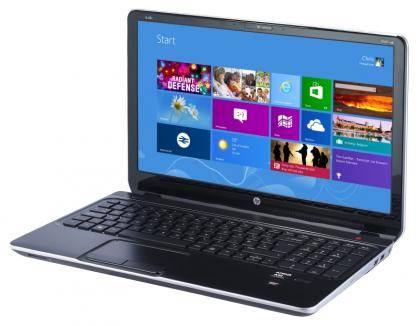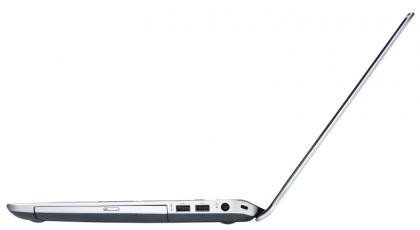
AMD’s mobile processors are commonly found in entry level laptops, but the HP Envy M6-1310sa is a mid-range AMD-powered laptop that’s powerful and well priced.
The HP Envy M6-1310sa quad-core 2.5GHz AMD A10-5750M processor is one of AMD’s Richland models, and it can increase its clock speed to 3.5GHz when there’s enough thermal headroom to do so. The processor is paired with 8GB of RAM, and together these components provide enough speed and memory capacity for everyday tasks such as web browsing and producing MS Office documents. This power is evidenced by the laptop’s overall score of 45 in our multimedia benchmarks, which makes the score roughly equivalent to one of Intel’s Core i5-3337U processors. You can be sure the M6-1310sa will be able to tackle demanding programs such as image and video-editing software without too much trouble.

However, the M6-1310sa beats its Intel rivals with its dedicated graphics. The A10-5750m’s built-in AMD Radeon HD 8650G graphics processor powered through our Dirt Showdown test and delivered a smooth 36.9fps average frame rate at a 1,280x720 resolution with graphics quality set to High. That’s a fantastic frame rate for a laptop at this price. Reducing the quality to Medium increased the frame rate even further to 40.2fps, so you should still be able to play many modern 3D games on the M6-1310sa with a good level of graphical detail.
The 15.6in 1,366x768 display was less impressive, but still reasonable for a sub-£600 laptop. Our colour calibrator showed it was displaying 62.8 per cent of the sRGB colour gamut, which is around average for a laptop screen, but its lack of blue and purple coverage meant images looked a little warmer than usual. This didn’t make too much of a difference in our solid colour image tests, but the colours in our high contrast test images were missing a lot of depth and vibrancy.

Our solid blacks also revealed that the lower half of the screen was much brighter than the upper part of the screen, which led to a visible gradient in the depth of our various colour tests. This was a shame, as its low black level of 0.22cd/m2 is one of the best we’ve seen from a laptop in this price range. Unfortunately, we couldn’t correct this problem by tilting the screen back without upsetting the screen's overall contrast.
This is partly due to the screen’s average contrast ratio of 481:1, but we could still see a good level of detail in our high contrast test images. We were particularly pleased with how much fine shadow detail we were able to pick out from a normal working angle, so you shouldn’t have to tilt the screen too much to get a good picture.